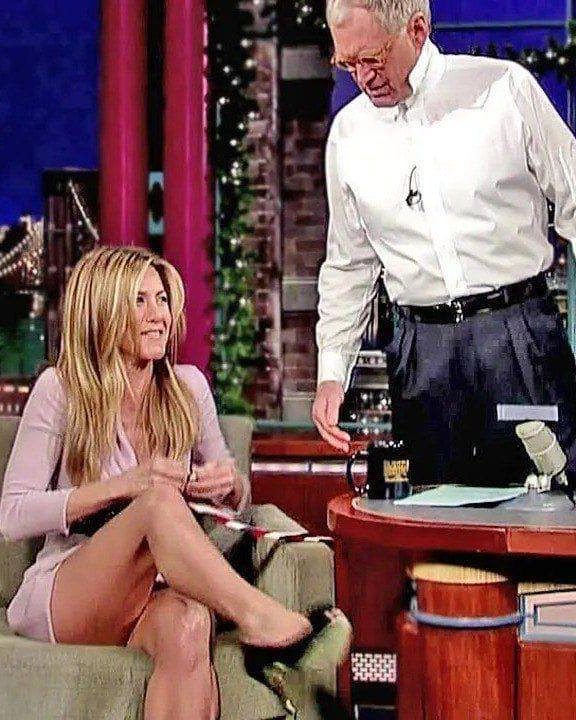David Letterman, once hailed as a late-night television maestro renowned for his sharp wit and unpredictable interviews, has seen some of his past on-air moments reexamined under contemporary scrutiny. A particular interview with Hollywood actress Jennifer Aniston has resurfaced, shedding light on the discomfort she experienced during their exchange

The 1998 Interview: An Unsettling Encounter
In 1998, Jennifer Aniston appeared on “The Late Show with David Letterman” to promote her film “The Object of My Affection.” What began as a standard promotional interview took an unexpected and unsettling turn. During their conversation, Letterman moved his chair closer to Aniston, stating, “Forgive me if this is rude, I just want to try one thing.” He then proceeded to take a strand of Aniston’s hair and placed it in his mouth, sucking on it briefly before pulling away. Aniston, visibly uncomfortable, exclaimed, “What are you doing?!” while nervously laughing. Letterman handed her a tissue to wipe off his saliva, saying, “I’m sorry.” The audience’s reaction was a mix of laughter and unease, reflecting the awkwardness of the moment.
Public Reaction and Modern Perspective
At the time, such behavior might have been dismissed as eccentric humor. However, with today’s heightened awareness of personal boundaries and respect, this incident has been revisited and criticized. Many viewers now perceive Letterman’s actions as inappropriate and invasive, highlighting a broader issue of how female celebrities have been treated in media interviews. The resurfaced clip has sparked discussions online, with many expressing discomfort and disapproval of Letterman’s conduct.
The 2006 Interview: Persistent Probing
Fast forward to 2006, Aniston returned to Letterman’s show to promote her film “The Break-Up.” This interview, too, veered into uncomfortable territory. Letterman fixated on Aniston’s attire—a black blouse paired with stylish black shorts—immediately commenting on her legs. He remarked, “That’s a tremendous outfit. And the reason that’s a tremendous outfit is because you have tremendous legs.” Despite Aniston’s attempts to steer the conversation toward her film, Letterman persisted, later adding, “Your legs, you’ve got something there.” The focus on her physical appearance overshadowed the intended discussion about her work, leaving Aniston visibly uneasy.
Questioning Personal Relationships
In the same 2006 interview, Letterman delved into Aniston’s personal life, specifically her rumored relationship with co-star Vince Vaughn. He inquired whether it was Vaughn’s idea for her to appear nude in the film, catching Aniston off guard. She deflected the question, suggesting that Letterman should have asked Vaughn when he was on the show. This line of questioning further contributed to the interview’s awkwardness, as it shifted focus from her professional achievements to her personal relationships
Aniston’s Composure Amidst Discomfort
Throughout these interactions, Aniston maintained her composure, often resorting to nervous laughter and deflecting uncomfortable questions with grace. Her ability to navigate such situations without overt confrontation reflects the challenges many female celebrities have historically faced in media interviews, where they are often subjected to invasive or inappropriate inquiries.
Reevaluating Past Media Practices
The resurfacing of these interviews has prompted a reevaluation of past media practices, especially concerning the treatment of women in the entertainment industry. What was once considered playful banter is now recognized as problematic behavior that undermines professional boundaries. This shift in perspective underscores the importance of respectful and relevant discourse in media interactions.
Conclusion: A Shift Towards Respectful Engagement
David Letterman’s interviews with Jennifer Aniston serve as a case study in the evolving standards of media conduct. They highlight the necessity for interviewers to engage with guests in a manner that respects their personal boundaries and focuses on their professional accomplishments. Aniston’s poise during these uncomfortable moments exemplifies her professionalism, while the public’s retrospective criticism of Letterman’s behavior reflects a societal shift toward more respectful and appropriate media engagements.
As the entertainment industry continues to evolve, these past incidents serve as reminders of the progress made and the work still needed to ensure that all individuals are treated with dignity and respect in the public eye.





